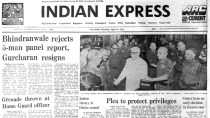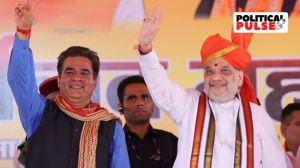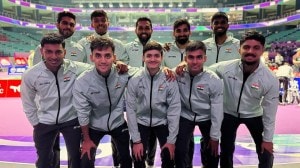- India
- International
Return of prudence
It’s good that India is in touch with Pakistan again. Now Modi must meet Nawaz Sharif.
The government’s decision to resume contact with Islamabad, after suspending bilateral talks last month, is welcome. Prime Minister Narendra Modi must now follow through by meeting his Pakistani counterpart Nawaz Sharif on the margins of the United Nations General Assembly. This paper has reported that National Security Adviser Ajit Doval and Foreign Secretary Sujatha Singh met Pakistan High Commissioner Abdul Basit a few days ago and reassured him of Prime Minister Modi’s commitment to the normalisation of relations with Islamabad. There is no word yet confirming a meeting between Modi and Nawaz Sharif, but Delhi must actively seek one during the brief period when both of them are in New York.
Last month, Delhi called off Sujatha Singh’s visit to Islamabad in protest against Basit’s meetings with the Hurriyat leaders. The decision was widely criticised as an impulsive response to the High Commissioner’s contact with the Hurriyat that has become routine over the last decade and a half. The move seemed to negate Modi’s special effort to encourage Sharif to attend his swearing-in ceremony at the end of May and begin his prime ministerial tenure with a positive approach to Pakistan. Whatever might have been the logic in suspending talks with Islamabad last month, prudence appears to have returned to Delhi’s Pakistan policy.
External Affairs Minister Sushma Swaraj got it right when she said recently that there are no full stops in diplomacy; only commas and semi colons. The history of India’s recent engagement with Pakistan reveals that every suspension ordered by Delhi has been followed inevitably by a resumption of dialogue. Yet, this episode should help the Modi government construct a more stable approach towards Pakistan. Delhi must stop dramatising the meetings with Islamabad, make them routine, and avoid raising expectations of a major breakthrough every time the top leaders meet. Above all, Delhi must delink talks with civilian leaders and cross-border terrorism. Elected leaders like Nawaz Sharif and his predecessor, Asif Ali Zardari, have eagerly supported normalisation of relations with India. But they have no control over Pakistan’s security policies. They neither authorise the acts of terror originating from across the border nor can they bring those responsible to justice. Treating Pakistan like a coherent black box has long led Indian diplomacy into dead ends. Delhi should, instead, differentiate between the civilian rulers and the “deep state” run by the Pakistan army. Modi must extend strong diplomatic support to Pakistan’s elected leadership at a moment when the Army is undermining Sharif’s political mandate through a soft coup.
EXPRESS OPINION
More Explained
Apr 26: Latest News
- 01
- 02
- 03
- 04
- 05

































